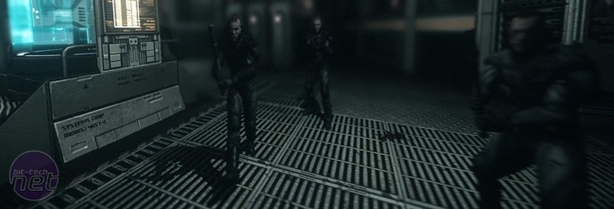
Inescapable Conclusion
In a nutshell, here’s why the original campaign Escape from Butcher Bay was so good; power. To play as Riddick made players feel powerful in just about everyway. It didn’t matter that you didn’t have any weapons for most of the game, nor that you were in an unfamiliar place and easily killed. You still had power, in a way and it came from both Vin himself and the fantastic pacing of the game as a whole.For starters, Vin Diesel is a big, deadly looking man and the game never hid that. Snapping the camera out to show certain actions in third person was a constant reminder of just how big and strong the player was. At the same time the measured reluctance of every dialogue elevated Riddick above his fellow prisoners in the first game. Quite simply, Riddick always seemed to have a plan.
In gameplay terms, restraining players was perhaps the biggest success of the first campaign. Violence was sporadic and firearms appeared only very late in the game. You were unarmed for so long that, by the time you did manage to slip a scalpel from the medical bay, you felt like king of the world. That went doubly for the second stage of the game where much time was spent arranging your plan and orchestrating your escape – plan and...strike!
Starbreeze has unfortunately fiddled with that pacing a little too much in the Dark Athena campaign, changing the game from something which at least felt strategic into something a bit more crude. Your escape from Butcher Bay felt unique, daring and dramatic. Your escape from The Dark Athena is more a collection of forgettable ‘avoid the searchlight’ sections and illogical fetch quests. The guards and inmates of Butcher Bay were individuals with character and dialogue – the enemies on The Dark Athena are faceless, nondescript drones.
The core of the game has changed too, as have the environments. No longer are you sneaking through crawl-vents to reach the next wide-open area, snapping necks along the way. Now you are running through endless hallways, attacking people head-on and easily surviving encounters with upto four or five drones. You start the game with a simple knife and are much faster than the robots, so evasion quickly takes a back seat compared to aggression.
To judge Dark Athena based solely on comparisons to Butcher Bay is perhaps a tad unfair, but it’s also realistic. If the game had had a simpler release format and both campaigns had launched as a single title then we’d still be accusing the latter half of the game of getting too simplistic – which was admittedly also a problem for Butcher Bay.
 It’s not that the Dark Athena campaign is all that bad either, it just isn’t as clever and unexpected as Butcher Bay. Butcher Bay stood out precisely because it worked so slowly and because you were a good hour or two into the game before you got to fight with anything but your fists. Dark Athena meanwhile feels a bit more rushed, practically forcing the ulaks (otherwise known as curvy-bladey-things) and tranq-gun into your hands as fast as possible.
It’s not that the Dark Athena campaign is all that bad either, it just isn’t as clever and unexpected as Butcher Bay. Butcher Bay stood out precisely because it worked so slowly and because you were a good hour or two into the game before you got to fight with anything but your fists. Dark Athena meanwhile feels a bit more rushed, practically forcing the ulaks (otherwise known as curvy-bladey-things) and tranq-gun into your hands as fast as possible.At the end of the day despite the unexpected quality of the original Chronicles of Riddick: Escape from Butcher Bay, Dark Athena has a predictable outcome; it’s definitely worth picking up if you haven’t played the original campaign as that alone is worth the cost. Veterans of the original release meanwhile shouldn’t expect anything they haven’t seen before.
Dark Athena is playable, decently sized and plenty of fun, but it doesn’t reach the same high-standard of the first game and although the multiplayer offsets that fact a little it doesn’t totally balance it out. If multiplayer had ever been intended for the game then it would have been added the first time around – a fault that could be equally levelled at drone guns and mech suits.
Score Guide

MSI MPG Velox 100R Chassis Review
October 14 2021 | 15:04











Want to comment? Please log in.